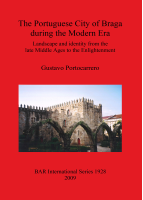Description
BOOK DESCRIPTIONThe construction of urban identities through the landscape during the Modern Era in Portugal, is an area of historical research which, so far, has been little explored. In this work, the author develops this theme with an emphasis on the city of Braga (north-west Portrugal). The study is also a 'humanist' alternative to the empiricism that is, presently, common in the studies of the cities of that period. Chapter 2 is a critical overview of the study of cities as it is presently conducted in Portugal. Chapter 3 delineates an alternative approach to the study of Modern Era cities in Portugal, with a focus on the concepts of identity and landscape. Chapter 4 offers a brief overview of the sources that were used in the research on Braga, with a particular focus on maps, documents and standing buildings. Chapter 5 is an analysis of what the city's landscape looked like by the late 15th century and what can be inferred about its identity through it. Chapters 6 and 7 are about the radical changes that took place in the city's identity and landscape in the early 16th century. Chapter 6 is about the space of the city proper and Chapter 7 discusses the outskirts. Chapter 8 relates the actions that took place in the middle of the 16th century under the initiative of the Church in order to consolidate Braga's catholic identity. Chapter 9 deals mostly with the actions of Fr. Agostinho da Cruz in the late 16th century in order to reaffirm Braga's primate status within the Hispanic Monarchy. Chapter 10 covers the years 1620-70, a period of strong political and social turmoil, which caused a crisis of identity in Braga. Chapter 11 argues that this crisis of identity was responsible in the late 17th century for a fragmentation of Braga's identity into smaller ones amongits inhabitants. Finally, Chapter 12 analyses the attempts by Archbishop D. Rodrigo Moura Teles in the early 18th century to create a common identity that again united Braga's inhabitants.











